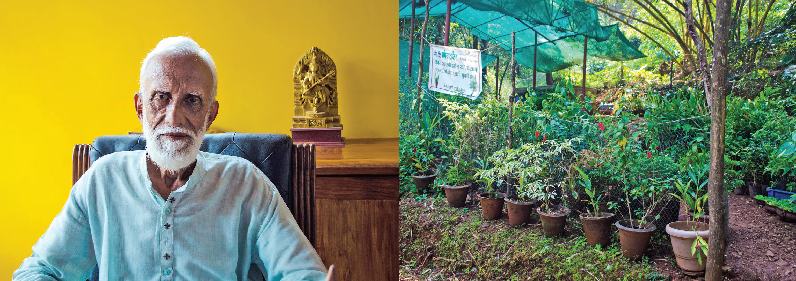Bringing in a change for a better tomorrow, Nirmal Vishwa has been undertaking various projects in Ponda for over 30 years, all with the aim of keeping the city clean and pollution-free

It's a red, snaky and narrow road that takes one uphill to Lokwan - the people's forest, in the literal sense of the word. Activities towards protecting and developing the forest area are carried out here. "Lokwan came about as a result of the contribution of the community towards compensating the ill-effects of environmental degradation and we are on our heels for the past 28 years, reducing the carbon footprint of our area," states K D Sadhale, with pride in his voice. The NGO, Nirmal Vishwa, under which projects like Lokwan run, is Sadhale's brainchild.
Taking a vow to make the surrounding ecology clean and waste-free, 50 odd like-minded members of Nirmal Vishwa live on, in and around Ponda. The word itself means a cleaner world, a pollution-free, healthy environment. "Our mantra is to grow more trees, keep the surroundings clean, make less waste, re-use the already created waste and conserve and preserve the environment around us," states Sadhale.
The history of Nirmal Vishwa travels back in time, more than three decades ago, where there were hardly any NGOs that worked towards protecting the environment. However, aware that people needed to know about the dangers that lay before them - the dangers of modern haphazard constructions in the name of the so-called development and urbanisation, Nirmal Vishwa decided to lead on this front and soon after the concept spread like wildfire. Slowly, the government too began had to initiate various educative programmes for mass awareness.
"But one cannot push every responsibility to be fulfilled by the government. As community, it's also our moral and ethical duty to contribute our bit," feels Pradip Kamat, secretary, Nirmal Vishwa, who has been striving hard to educate the rural masses to conserve water.
Watershed construction, rainwater harvesting and agriculture on the hill-tops are important steps that would take Ponda to greener pastures, realised Pradip and hence devoted himself to this cause. "It is only through individual attempts that the community enterprise can rise and influence the system to change. We are taking up new programmes to induce individuals to become pioneers to change for better today and better tomorrow," adds Pradip, a professional land developer.
It was a decade ago that Pradip ventured into rainwater harvesting with four villages - Kavlem, Kurti, Bandoda and Betoda during 2003-2007 and then moved on to another five including Nirankal, Shiroda, Panch Konshe. Over 10,000 hectare of land has been covered so far and around 8 lakh trenches have been constructed. "One example of our success is the Kapileshwari lake, where the water level had gone very low. After rainwater harvesting was done, the level of this lake has gone up considerably," points out Pradip.
Pradip also mentions that a stream flowing through four-five villages in Ponda used to get flooded every year in the monsoons and the water used to go into the homes. "For the last eight years, the stream has not overflowed. The flash floods have now stopped. The soil acts like a dam and has stopped the water from getting into the stream now," he adds.
This process allowed the Nirmal Vishwa team to get associated with the locals. A dialogue and interaction started and around 200 self-help groups of 10-20 people each came into being. These groups are still in touch with each other. The villages have become active too. "Looking back, these are our accomplishments, which give us immense satisfaction," admits Pradip. However, he laments that Ponda which was an agricultural village few decades ago, now has become urbanised and people have stopped farming. There are still so many beautiful spots in these villages which could be promoted for tourism, he says.
Detailing further on the forest activities that they conduct, Pradip states that they collect and plant various types of plants in their surroundings. "We work on multiple projects at Lokwan, an area of 50,000 sq metres where we carry out our activities - that of collecting and arranging recycling or re-using of plastic waste. We also have the working models of converting dry leaves, twigs and wood waste into coal which can be used for smokeless cooking. We convert building debris into building blocks. The collected food waste is converted into cooking (gobar) gas while the dry leaves turn into compost manure. Our volunteers train people on the methods of vermin-composting. We also collect rain water and re-use it for various purposes," briefs Pradip.
The activities also involve agriculture and gardening wherein planting of ornamental and indigenous plants, cultivation of vegetables, supply of seeds, using of organic manure like cow dung and gomutra, garden soil, leaf mould, compost and garden pots is carried out. In addition to these, Lokwan plans to expand its span of activities. The mature Acasia trees will be removed and other trees will be planted in their place, while developing Lokwan as a bio-diversity park.
Describing the plan, Sadhale adds, "We have big plans of development at Lokwan - from planting natural indigenous forest species, fruit trees, vegetables, fodder, nursery, spices and medicinal trees to divine trees surround a meditation centre. Walking, jogging and cycling tracks, gymnasium, naturopathy centre, butterfly-park, bird identification, pollution testing centre, wild life rescue centre, solar energy equipment and so on will come on this hill top..."
Indeed, the woods at Lokwan are dark, lovely and deep. "And we have promises to keep and miles to go before we sleep," says Sadhale, quoting poet Robert Frost.